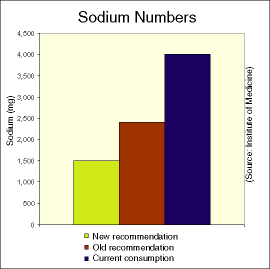Cost of Sodium Intake
 Perhaps nothing so exposes what is wrong with America's current healthcare system as the way we as a society have dealt so far with the #1 killer of Americans.
Perhaps nothing so exposes what is wrong with America's current healthcare system as the way we as a society have dealt so far with the #1 killer of Americans.
Despite the overwhelming evidence showing that added dietary salt and the increased blood pressure (BP) it causes lead to far more deaths in America than tobacco, obesity, inactivity, all infectious diseases combined, etc. The Food and Drug Administration still classifies salt as "generally recognized as safe." A comprehensive analysis examined the likely public health benefits of reducing the average American's salt intake by only 3 grams (or 1200 mg sodium) per day and found it "...would save 194,000 to 392,000 quality adjusted lifeyears and $10 billion to $24 billion in healthcare costs annually."1
According to Dr. Bibbins- Domingo, the data show that even a modest 3 gram (g) reduction in average daily salt intake would save as many lives over the next 10 years as getting every American smoker to quit for good tomorrow. Reducing salt intake from the current 10 g per day to less than 3.7 g salt (or 1500 mg sodium) per day now recommended by the Center for Disease Control, the Institute of Medicine, and American Heart Association for most Americans would lower BP far more than the modest 3g reduction Dr. Bibbins- Domingo used in her analysis. Indeed, data from human populations that add very little or no salt to their food show little or no tendency for BP to rise with age and a virtual absence of primary hypertension.2 Data from the Framingham Heart Study found that the majority of Americans had hypertension by age 65 and more than 2/3 of those who made it to age 65 without hypertension developed it within 10y and 90% within 20 years.3
A recent report from the World Health Organization concluded hypertension was responsible for 7.5 million deaths worldwide annually compared to less than 5.3 million deaths from tobacco.4 hypertension is largely due to the modern diet and lifestyle and especially added salt. Data from the Pritikin Longevity Center showed that a low-fat, low sodium (<1500 mg/day) diet with limited lean animal protein (mostly seafood) but high in whole grains, fruits, and vegetables coupled with exercise could lower BP so effectively most participants were able to discontinue all antihypertensive medications and achieve a lower BP with diet and lifestyle changes alone.5 In populations where salt intake has been reduced the death rate from cardiovascular disease (CVD) is declining.
Despite the established and primary role that added salt plays in the development of hypertension and the fact that as a risk factor hypertension alone accounts for about half of all CVD morbidity and mortality, most health insurance (private and public) will not pay for expert dietary counseling and other lifestyle changes. If implemented, these could prevent and even reverse hypertension and largely prevent most CVD events. Even in patients with resistant hypertension, whose BP remains high despite 3 or more BP-drugs, health insurance won't pay for expert dietary counseling even though BP fell on average 22.7/9.1mmHg in just 7 days when the only intervention was restricting salt to less than 1200mg sodium/day.6 Even so Medicare and most private insurers will not pay for expert dietary counseling for people with hypertension or even resistant hypertension.
Bottom Line: Perhaps it is time to re-think healthcare in America, which seems intent on treating diet and lifestyle-caused ills with drugs and surgery. By marginalizing nutrition professionals and personal responsibility the health insurance industry, medical profession, pharmaceutical industry, hospitals, and food industry all rack up huge profits while more Americans are becoming disabled and dying from ills caused largely by added dietary salt and poor dietary choices that could be dramatically improved by dietary counseling and public health measures.
By James J. Kenney, PhD, RD, FACN
References:
1. N Engl J Med. January 20, 2010 at (10.1056/NEJMoa09073550)
2. Hypertension 1985;7:628-37
3. AMA 2002;287:1003-10
4. Mathers C, Stevens G, Mascarenhaus M. Global Health Risks: mortality and burden of disease attributable to selected major risks. Geneva, Switzerland: World Health Organization; 2009. available at: http://www.who.int/healthinfo /global_burden_disease/glob al_health_risks/en/index.html
5. J Cardiac Rehab 1983;3:839-46 6. Hypertension 2009;54:475-81